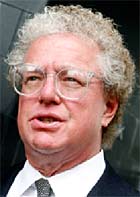|
|
|
Leading Attorney Pleads Guilty to Receiving Kickbacks
Attorneys in the News |
2007/10/30 12:13
|
William Lerach, the shareholder lawsuit lawyer who was once called the “most hated man in high tech,” pleaded guilty yesterday to a conspiracy charge for his role in an illegal scheme to pay people to become plaintiffs in shareholder complaints.
Lerach, 61, of San Diego became the eighth person to plead guilty in connection with a seven-year investigation into the conduct of his former law firm, Milberg Weiss, prosecutors said.
Flanked by his lawyers, Lerach stood in court with his left elbow propped up on a lectern. He answered questions from U.S. District Judge John Walter in a firm voice.
“Guilty, your honor,” Lerach said when Walter asked how he would plead.
A sentencing hearing was set for Jan. 14. Under terms of the plea agreement Lerach struck with prosecutors last month, he faces a sentence of one to two years in prison. But Walter does not have to follow the agreement's terms.
Lerach also agreed to forfeit $7.75 million to the government and pay a $250,000 fine.
Walter told Lerach that he could lose his law license. The lawyer said he understood.
As the hearing broke up, Lerach walked over to the three federal prosecutors in the Milberg Weiss investigation and shook their hands. He shared a laugh with Assistant U.S. Attorney Robert McGahan.
Outside of court, Lerach's lawyer John Keker said he had no comment.
The New York-based Milberg Weiss firm, its co-founder Melvyn Weiss and Palm Springs lawyer Paul Selzer face trial next year in connection with the probe. The firm and Weiss have pleaded not guilty. Selzer's lawyer and prosecutors have said they are trying to reach a plea agreement.
Lerach is the third of three former Milberg Weiss partners to plead guilty in the investigation. David Bershad and Steven Schulman entered their pleas earlier this year and are cooperating with prosecutors.
Under terms of Lerach's plea agreement, he is not required to cooperate.
Lerach joined Milberg Weiss in 1976 and headed its West Coast operation. In 2004, he quit and started his own practice. Just before striking his deal with prosecutors, Lerach announced his retirement from the firm now known as Coughlin Stoia Geller Rudman & Robbins. Prosecutors agreed they would not charge Coughlin Stoia in the Milberg Weiss probe under terms of the plea deal.
Over the past two decades, Lerach has gained notoriety for filing class-action lawsuits against companies that saw their stock prices plummet. In the 1990s, such fraud lawsuits often involved high-tech companies.
Prosecutors contend that in some cases Milberg Weiss gamed the judicial system to its benefit.
The charges contend that Weiss and others helped steer secret payments to people who agreed to serve as plaintiffs in class-action lawsuits. Across the country, the firm had a string of these paid clients at the ready, which allowed Milberg Weiss to be the first to file class-action lawsuits. By being first, Milberg stood a good chance of receiving the lion's share of attorney fees when the cases were resolved.
Under the law, the lead plaintiff in a class-action shareholder suit must serve as a representative of the class and cannot have a special interest or hidden inducement beyond other shareholders in the case.
Prosecutors said Lerach and others, by participating in the secret payment scheme, betrayed their fiduciary duties of loyalty, honesty and trust to their other clients. If the secret payments had been uncovered, prosecutors said, judges overseeing the cases could have disqualified the law firm from serving in the case.
Lerach acknowledged making secret payments to plaintiff Steven Cooperman, 64, and stated that other plaintiffs received payments from other Milberg Weiss partners, typically 10 percent of the fees the firm received.
Lerach and his family have contributed heavily to political campaigns in the past two decades. He once hosted a fundraising event for former President Clinton at Lerach's Rancho Santa Fe home.
Among the current pack of presidential candidates, Lerach has contributed to Democratic presidential contender John Edwards' campaign. But officials with the former U.S. senator have said they gave the $4,600 donation to charity after Lerach's plea agreement became public. |
|
|
|
|
|
|
Class action or a representative action is a form of lawsuit in which a large group of people collectively bring a claim to court and/or in which a class of defendants is being sued. This form of collective lawsuit originated in the United States and is still predominantly a U.S. phenomenon, at least the U.S. variant of it. In the United States federal courts, class actions are governed by Federal Rules of Civil Procedure Rule. Since 1938, many states have adopted rules similar to the FRCP. However, some states like California have civil procedure systems which deviate significantly from the federal rules; the California Codes provide for four separate types of class actions. As a result, there are two separate treatises devoted solely to the complex topic of California class actions. Some states, such as Virginia, do not provide for any class actions, while others, such as New York, limit the types of claims that may be brought as class actions. They can construct your law firm a brand new website and help you redesign your existing law firm site to secure your place in the internet. |
Law Firm Directory
|
|





